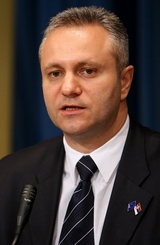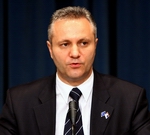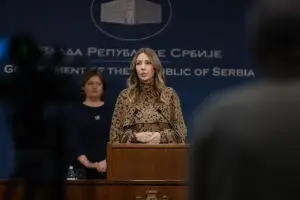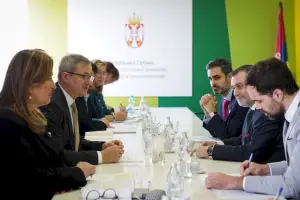Q:
A:
Government adopts Bill on 2006 budget
Belgrade,
28 October 2005
Serbian Minister of Finance Mladjan Dinkic said that late today the government adopted the Bill on the budget of the Republic of Serbia for 2006 at an extraordinary session.
Speaking at a press conference held after the session, Dinkic said that the planned budget revenues for 2006 are 487.9 billion dinars and expenditures 448.3 billion dinars, which means that Serbia will have budget surplus for the second year in a row, amounting to 39.6 billion dinars in 2006.
He explained that this budget envisages, first and foremost, a long-term reduction of public spending by 1.3 percent of GDP. That will be achieved mainly by rationalisation of expenditures in the health insurance fund, reduction of subsidies to poorly performing domestic companies and diminishing the salaries fund of state bodies.
According to Dinkic, the budget surplus will be used for the repayment of domestic and foreign debts, and substantial funds will be set aside for special government programmes, such as housing loans, export loans, micro loans for unemployed persons, loans for boosting regional development and for the Fund for Young Talents.
He added that the new budget envisages an increase in public investments worth 0.3 percent of GDP, which will be directed towards several segments of the Ministry of Culture, Ministry of Religion, and Ministry of Education and Sport.
Speaking of the macroeconomic hypotheses according to which the budget is planned, Dinkic said that a 5 percent growth of the GDP is envisaged for the upcoming year, while the rate of inflation should be 9.3 percent.
Dinkic said that the Bill on the budget for 2006 is in complete accordance with the Mission of the International Monetary Fund, adding that it will go through regular parliamentary procedure, which means that the adoption of the Bill can be expected to take place in the second half of November.
A novelty in the 2006 budget is that the health fund will have a surplus for the first time since 1945, worth 9 billion dinars, coming as a result of voluntary retirement by 7,140 workers in the health sector and permanent abolition of their positions, as well as abolition of unnecessary expenditures, Dinkic said.
As for the use of the budget surplus, 47.4 billion dinars will be directed towards the repayment of a major amount of public debt, of which 40.4 billion dinars will be used for repayment of domestic debt (the state's debt to citizens for old foreign currency savings, the loan for economic recovery of Serbia and the debt to pensioners), while 6.4 billion dinars will be used for the repayment of foreign debt, Dinkic specified.
He said that as part of special government programmes, 2.8 billion dinars has been earmarked for housing loans, 1.5 billion dinars for crediting export activities, 1 billion each for micro loans for unemployed and for boosting regional development, while the Fund for Young Talents will receive 900 million dinars, which is twice the amount of this year’s allotment.
According to the minister, public investment in the field of culture will be used for reconstruction of all capital objects of the nation’s cultural institutions, that is, 40 million dinars each for the reconstruction of the National Library and the National Museum, 130 million dinars towards Serbian film production, 140 million dinars for the purchase of books, and 15 million dinars for publishing projects.
Another novelty in the 2006 budget is the introduction of a national pension of 30,000 dinars per month for 100 distinguished independent artists. The beneficiaries will be selected by an expert commission after the adoption of the budget, Dinkic said.
He added that the state will continue the reconstruction of the Hilandar monastery and has set aside 115 million dinars for that purpose. Belgrade’s National Theatre will be financed with 84 million dinars, and the Serbian National Theatre in Novi Sad with 48 million dinars. At the same time, the renovation of theatres in Subotica and Uzice is envisaged, as well as revitalisation of the cinema network in smaller towns in Serbia.
Dinkic said that the budget for sport in 2006 will be twice that of this year. The state will set aside two billion dinars for sport, of which €2.5 million will be invested in the construction of facilities that will be used for the Universiade in 2009, and €1 million will be used for complete reconstruction of the swimming pool at the Banjica sports centre, which will be used in the European Water Polo Championship. In addition, significant funds have been set aside for the reconstruction and construction of local sport facilities on the entire territory of Serbia.
According to Dinkic, the Ministry of Religion will receive five times more funds in 2006 than this year, which will be used for reconstruction and adaptation of religious facilities in Serbia. Finally, Dinkic noted, a half a billion dinars has been set aside for Serbia's border crossings.
He explained that this budget envisages, first and foremost, a long-term reduction of public spending by 1.3 percent of GDP. That will be achieved mainly by rationalisation of expenditures in the health insurance fund, reduction of subsidies to poorly performing domestic companies and diminishing the salaries fund of state bodies.
According to Dinkic, the budget surplus will be used for the repayment of domestic and foreign debts, and substantial funds will be set aside for special government programmes, such as housing loans, export loans, micro loans for unemployed persons, loans for boosting regional development and for the Fund for Young Talents.
He added that the new budget envisages an increase in public investments worth 0.3 percent of GDP, which will be directed towards several segments of the Ministry of Culture, Ministry of Religion, and Ministry of Education and Sport.
Speaking of the macroeconomic hypotheses according to which the budget is planned, Dinkic said that a 5 percent growth of the GDP is envisaged for the upcoming year, while the rate of inflation should be 9.3 percent.
Dinkic said that the Bill on the budget for 2006 is in complete accordance with the Mission of the International Monetary Fund, adding that it will go through regular parliamentary procedure, which means that the adoption of the Bill can be expected to take place in the second half of November.
A novelty in the 2006 budget is that the health fund will have a surplus for the first time since 1945, worth 9 billion dinars, coming as a result of voluntary retirement by 7,140 workers in the health sector and permanent abolition of their positions, as well as abolition of unnecessary expenditures, Dinkic said.
As for the use of the budget surplus, 47.4 billion dinars will be directed towards the repayment of a major amount of public debt, of which 40.4 billion dinars will be used for repayment of domestic debt (the state's debt to citizens for old foreign currency savings, the loan for economic recovery of Serbia and the debt to pensioners), while 6.4 billion dinars will be used for the repayment of foreign debt, Dinkic specified.
He said that as part of special government programmes, 2.8 billion dinars has been earmarked for housing loans, 1.5 billion dinars for crediting export activities, 1 billion each for micro loans for unemployed and for boosting regional development, while the Fund for Young Talents will receive 900 million dinars, which is twice the amount of this year’s allotment.
According to the minister, public investment in the field of culture will be used for reconstruction of all capital objects of the nation’s cultural institutions, that is, 40 million dinars each for the reconstruction of the National Library and the National Museum, 130 million dinars towards Serbian film production, 140 million dinars for the purchase of books, and 15 million dinars for publishing projects.
Another novelty in the 2006 budget is the introduction of a national pension of 30,000 dinars per month for 100 distinguished independent artists. The beneficiaries will be selected by an expert commission after the adoption of the budget, Dinkic said.
He added that the state will continue the reconstruction of the Hilandar monastery and has set aside 115 million dinars for that purpose. Belgrade’s National Theatre will be financed with 84 million dinars, and the Serbian National Theatre in Novi Sad with 48 million dinars. At the same time, the renovation of theatres in Subotica and Uzice is envisaged, as well as revitalisation of the cinema network in smaller towns in Serbia.
Dinkic said that the budget for sport in 2006 will be twice that of this year. The state will set aside two billion dinars for sport, of which €2.5 million will be invested in the construction of facilities that will be used for the Universiade in 2009, and €1 million will be used for complete reconstruction of the swimming pool at the Banjica sports centre, which will be used in the European Water Polo Championship. In addition, significant funds have been set aside for the reconstruction and construction of local sport facilities on the entire territory of Serbia.
According to Dinkic, the Ministry of Religion will receive five times more funds in 2006 than this year, which will be used for reconstruction and adaptation of religious facilities in Serbia. Finally, Dinkic noted, a half a billion dinars has been set aside for Serbia's border crossings.












